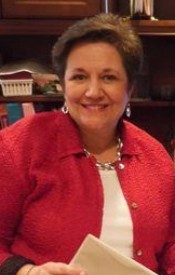|
|

Emily Bleynat Chapman – Class of 1980
Educator II, J. Iverson Riddle Developmental Center, Morganton
 “It was like coming home.” With those words, Emily Bleynat Chapman describes how she felt when she began her job as an educator at the J. Iverson Riddle Developmental Center. She is serious about helping her students, who are severely and profoundly intellectually disabled young people aged 22 and younger. Her subject matter ranges from math and biology to social sciences and vocational skills. “My curriculum is adapted by the state from the North Carolina Standard Course of Study. I usually have to modify the lessons even more to meet the needs of the individual students. We are not driven by testing standards set by the state. Our lessons are resident driven. Whatever their needs are, we try to provide.” “It was like coming home.” With those words, Emily Bleynat Chapman describes how she felt when she began her job as an educator at the J. Iverson Riddle Developmental Center. She is serious about helping her students, who are severely and profoundly intellectually disabled young people aged 22 and younger. Her subject matter ranges from math and biology to social sciences and vocational skills. “My curriculum is adapted by the state from the North Carolina Standard Course of Study. I usually have to modify the lessons even more to meet the needs of the individual students. We are not driven by testing standards set by the state. Our lessons are resident driven. Whatever their needs are, we try to provide.”
 J. Iverson Riddle Development Center (formerly known as Western Carolina Center) is one of three state operated residential facilities which provides services and support to individuals with intellectual and developmental disabilities, complex behavioral challenges, and/or medical conditions whose clinical treatment needs exceed the level of care available in the community. Each resident has a Person Centered Plan, and in addition, each student also has an Individualized Education Program (IEP) put together by a team. Medical or physical needs are addressed for each person. For example, a special wheelchair can be designed to meet the special physical needs of a resident. Full medical and nursing care is always available. They also have speech and psychological services provided as needed. J. Iverson Riddle Development Center (formerly known as Western Carolina Center) is one of three state operated residential facilities which provides services and support to individuals with intellectual and developmental disabilities, complex behavioral challenges, and/or medical conditions whose clinical treatment needs exceed the level of care available in the community. Each resident has a Person Centered Plan, and in addition, each student also has an Individualized Education Program (IEP) put together by a team. Medical or physical needs are addressed for each person. For example, a special wheelchair can be designed to meet the special physical needs of a resident. Full medical and nursing care is always available. They also have speech and psychological services provided as needed.
“In order to receive a certificate of attendance, a student must complete 21 credits. The certificate is quite an accomplishment, providing a real sense of satisfaction to both the student and his/her family. I work to find craft projects that help them be productive. For example, last Christmas, my students made Christmas cards with artwork made with forks. It tuned out very well.
“Each of my students learn in an entirely individual way. The challenges lie in trying to figure out how to teach a skill that is functional in their world. Sometimes that skill is as simple as writing their names. Progress is slow, but when the skill is mastered, the feeling of accomplishment is so great. It is important to help these young people have positive feelings. In fact, the most important factor is to help them know that they are loved. I certainly love each one of them.
“The goal is to teach skills that will make each student’s life better when he leaves the Center and goes to a group home. Of course, many of our residents are not able to function in the general population, but many are able to do so.”
The Center also provides vocational training and paying jobs. Each resident has the right to work and earn a living. The jobs include making crafts such soaps, pottery, weaving, jewelry, signs, pictures, and stencils. The group that Emily works with makes and sells dog biscuits. At the present time, 48 local business such as convenience stores, veterinary clinics, pharmacies, and others provide a place for the items to be sold. All the sales are pure profit, and last year the business earned nearly $14,000.
In 1984, Emily earned her Bachelor of Science degree in Special Education from Appalachian State. She later received her Master of Education degree from UNC-Charlotte. She is certified to work with all types of students, primarily those with mental handicaps and received her K-6 certification from Lees-McRae College. She has also received other certifications including English grades 9-12, reading K-12, and certification to teach the severely and profoundly mentally handicapped.
“I had wonderful experiences at East Burke. My uncle John Bleynat served on both the county commission and the school board. He often spoke of the many complaints that he heard about the building of consolidated schools in Burke County. But he knew that was the best path to take and was instrumental in the consolidation process. He said he never regretted the decision. I agree completely. The larger schools provided so many wonderful opportunities. Some of the activities I took part in were Anchor Club, French Club (we went traveling!), marching band, and musical theater. Band director Kathryn Siphers was a real inspiration. She taught motivation and focus, so much more than just what we did on the field. I have such respect for English teacher Sherron Prewitt, and the skills she inspired stay with me today. The musical theater presentations “My Fair Lady” and “Fiddler on the Roof,” directed by Phyllis Garrison, helped me with self-confidence. One doesn’t have to have a major speaking or singing role in a musical to learn stage presence and how to present oneself in front of an audience. And it’s fun!
“I have always thought that it is the principal who sets the tone for a school. Mr. T. W. Wall was principal when I was a student at East Burke, and he impressed me by keeping control of the student body and keeping the school where it needed to be. Later on, Rexanna Lowman became a professional and personal mentor. She opened many doors for me, and I am very appreciative.
“I began my career by teaching in the Exceptional Children’s program at Freedom High School. Then I worked with the Department of Health and Human Services for two years, serving the Center and Broughton Hospital by supervising a team that trained people in community living skills. After I received my elementary certificate, I taught third grade at Rutherford College Elementary School for a year. Then I moved on to East Burke High where I taught Reading from 2005 until 2017. I also worked as an instructional coach in the field of social studies and literacy. I have had a varied educational career. I sometimes refer to myself as a ‘Jack of all trades’ in the educational world.
“I love my job and my students here at JIRDC. I truly feel that God led me here to work with these young people. It’s challenging, but I feel such love for them and am rewarded every day when they feel accomplishment.”
Published February 2020
Home Page
|
|
|
|